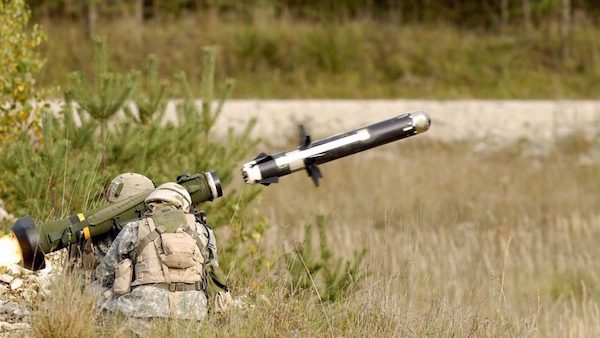
File photo showing a soldier firing a US-made Javelin anti-tank missile
Estonia, Latvia and Lithuania have announced plans to send American weaponry to Ukraine, citing "possible Russian aggression", as the first shipment of the United Statesí $200 million military package arrived in Kiev.
"The United States will continue providing such assistance to support Ukraineís Armed Forces in their ongoing effort to defend Ukraineís sovereignty and territorial integrity against Russian aggression," the US Embassy said on Saturday.
The delivery followed US Secretary of State Antony Blinkenís visit to Kyiv this week and his Friday talks with with Foreign Minister Sergei Lavrov in a bid to lower temperature amid simmering tensions over Ukraine.
But the arrival of the US military aid in Kiev on Saturday put the kibosh on those hopes. In a joint statement on Friday, the three Baltic members of the US-led NATO military alliance also announced their plans to send arms to Ukraine.
"This aid will further enhance Ukraineís capability to defend its territory and population in case of a possible Russian aggression," they said.
On Wednesday, US State Department sources said Washington had granted permission to the trio to send US-made anti-tank and anti-aircraft missiles as well as other armaments to Ukraine.
German Defense Minister Christine Lambrecht, however, ruled out arms deliveries.
"We have to do everything to de-escalate. Currently, arms deliveries would not be helpful in this respect. There is agreement on this in the German government," Lambrecht said in an interview with the Welt am Sonntag published Saturday.
Ukraine, instead, will receive a complete field hospital together with the necessary training in February, all co-financed by Germany for 5.3 million euros, she said.
German Chancellor Olaf Scholz has stressed Berlinís policy of not supplying lethal weapons to conflict zones.
According to Fridayís joint statement, Estonia will provide Javelin anti-tank missiles, while Latvia and Lithuania will give Stinger anti-aircraft missiles to Ukraine.
The Lithuanian ministry said the weapons would be delivered "in the nearest future."
NATO non-committal on pullout from Romania, Bulgaria
The development also coincided with NATOís rejection on Friday of Moscowís demands to withdraw its forces from Romania and Bulgaria.
"NATO will not renounce our ability to protect and defend each other, including with the presence of troops in the eastern part of the alliance," its spokeswoman Oana Lungescu said.
Earlier Friday, the Russian foreign ministry said the security guarantees Moscow seeks from the West include provisions requiring NATO forces to leave Romania and Bulgaria.
Russia has demanded legally binding guarantees from the military alliance that it will halt its eastward expansion and return to its 1997 borders.
Replying to an inquiry about what would that mean for Bulgaria and Romania which joined NATO after 1997, the ministry said Russia wanted all foreign troops, weapons and other military hardware withdrawn from those countries.
Blinken, however, took a tough line after talks with Lavrov in Geneva, warning Moscow of a "swift, severe and a united response" if it invaded Ukraine.
The top American and Russian diplomats failed to make any major breakthrough in their talks on Ukraine, with Lavrov reiterating that Moscow was still waiting for a written response to its demands for security guarantees.
US declares NATO war games in the Mediterranean
Washington further ratcheted up tensions by announcing a large-scale NATO naval war game in the Mediterranean.
Pentagon spokesman John Kirby said on Friday that the military maneuvers will begin on Monday with the participation of aircraft carrier USS Harry Truman.
"Neptune strike 22 is going to run through February 4 and itís designed to demonstrate NATOís ability to integrate the high-end maritime strike capabilities of an aircraft carrier strike group to support the deterrence and defense of the Alliance," Kirby declared.
Nevertheless, he claimed that preparations for the war game had begun in 2020 and had nothing to do with fears that Russia could invade Ukraine.
Even so, he acknowledged that tensions with Russia had motivated the allies to hold the military drills.
"There was due consideration about -- given tensions right now -- about our exercise posture. And after all that consideration and discussion with our NATO allies, the decision was made to move ahead," he told reporters.
"Neptune Strike 2022," however, does not appear on the list of scheduled war games for 2022 published by NATO on its website on December 14, 2021, according to press reports.
Russia will stage its own sweeping set of naval maneuvers at the same time from the Pacific to the Atlantic, involving all its fleets.
LINK: https://www.ansarpress.com/english/26336
TAGS:






























 online news tv
online news tv




